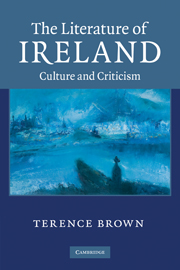Book contents
- Frontmatter
- Contents
- Acknowledgements
- Introduction
- 1 The Literary Revival: historical perspectives
- 2 Joyce's magic lantern
- 3 Music: the cultural issue
- 4 Modernism and revolution: rereading Yeats's ‘Easter 1916’
- 5 Shakespeare and the Irish self
- 6 Irish literature and the Great War
- 7 Ireland, Modernism and the 1930s
- 8 Post-modernists: Samuel Beckett and Flann O'Brien
- 9 Patrick Kavanagh: religious poet
- 10 MacNeice's Irelands: MacNeice's islands
- 11 Louis MacNeice and the Second World War
- 12 MacNeice and the puritan tradition
- 13 John Hewitt and memory: a reflection
- 14 Michael Longley and the Irish poetic tradition
- 15 Seamus Heaney: the witnessing eye and the speaking tongue
- 16 Derek Mahon: the poet and painting
- 17 Telling tales: Kennelly's Cromwell and Muldoon's ‘The More a Man Has the More a Man Wants’
- 18 Redeeming the time: John McGahern and John Banville
- 19 ‘Have we a context?’: transition, self and society in the theatre of Brian Friel
- 20 Hubert Butler and nationalism
- 21 The Irish Dylan Thomas: versions and influences
- Index
- References
19 - ‘Have we a context?’: transition, self and society in the theatre of Brian Friel
Published online by Cambridge University Press: 05 June 2012
- Frontmatter
- Contents
- Acknowledgements
- Introduction
- 1 The Literary Revival: historical perspectives
- 2 Joyce's magic lantern
- 3 Music: the cultural issue
- 4 Modernism and revolution: rereading Yeats's ‘Easter 1916’
- 5 Shakespeare and the Irish self
- 6 Irish literature and the Great War
- 7 Ireland, Modernism and the 1930s
- 8 Post-modernists: Samuel Beckett and Flann O'Brien
- 9 Patrick Kavanagh: religious poet
- 10 MacNeice's Irelands: MacNeice's islands
- 11 Louis MacNeice and the Second World War
- 12 MacNeice and the puritan tradition
- 13 John Hewitt and memory: a reflection
- 14 Michael Longley and the Irish poetic tradition
- 15 Seamus Heaney: the witnessing eye and the speaking tongue
- 16 Derek Mahon: the poet and painting
- 17 Telling tales: Kennelly's Cromwell and Muldoon's ‘The More a Man Has the More a Man Wants’
- 18 Redeeming the time: John McGahern and John Banville
- 19 ‘Have we a context?’: transition, self and society in the theatre of Brian Friel
- 20 Hubert Butler and nationalism
- 21 The Irish Dylan Thomas: versions and influences
- Index
- References
Summary
Brian Friel's drama has always attended to precise social moments in the history of the Irish people, and his imagination has repeatedly been drawn to those phases in Irish social experience that can be reckoned as transitional. His earliest success achieved in Philadelphia, Here I Come! (first performed at the Gaiety Theatre, Dublin, in 1964) accordingly took as its ostensible subject Irish emigration as social fate, at the very moment when altering economic conditions and communications were to make the act of departure from the native place altogether less absolute and definitive than they had traditionally been. Ten years later, Gar O'Donnell would have had the chance of university in Galway, Dublin or Coleraine (to which many Donegal students flocked in the 1970s), and twenty years later he would have lobbied for a Green Card and spent his summers in Ireland reckoning Boston to Shannon a comparatively inexpensive, short flight. The Loves of Cass McGuire (first performed in New York at the Helen Hayes Theatre in 1966) also caught a poignant moment of transition in Irish/Irish American relations, focusing at just that point in social history when an economically resurgent country, with its eyes on membership of the European Community, was beginning to recover from its infatuation with all things American (that infatuation reaching hysterical proportions during John Kennedy's all too brief presidency and a kind of orgasmic intensity during his visit to the land of his forebears in 1962).
- Type
- Chapter
- Information
- The Literature of IrelandCulture and Criticism, pp. 239 - 251Publisher: Cambridge University PressPrint publication year: 2010

